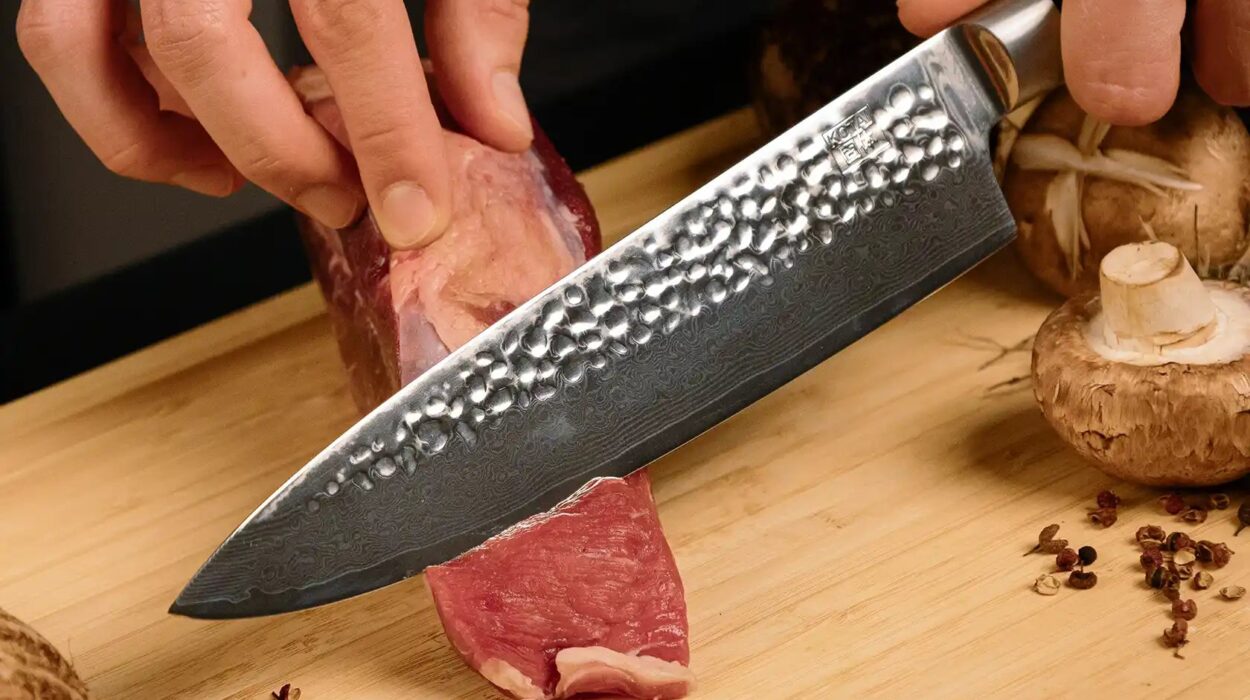For those who are passionate about cooking, a damascus knife for vegetable chopping stands out as an essential tool in the kitchen. With its intricate design and renowned sharpness, this knife has captured the interest of both professional chefs and home cooks. Whether you’re dicing fresh tomatoes or slicing through crunchy bell peppers, the right knife can make all the difference.
Originating from the tradition of ancient blade-making, the modern Damascus knife continues to be cherished for its performance and aesthetic. If you’ve ever wondered what makes these knives so special and why they are recommended for vegetable chopping, this article delves deeply into its unique attributes.

What Exactly Is a Damascus Knife?
A Damascus knife is not just any ordinary cutting tool. Its origin traces back to the Middle East, where the creation of Damascus steel became a closely-guarded secret. The distinct wavy patterns that characterize these knives are not just for beauty. They result from a forging process where multiple layers of steel are fused together, giving them remarkable strength and durability. For more on the fascinating history and science behind Damascus steel, you can click on this link.
Why Choose Damascus for Vegetables?
Chopping vegetables demands precision and efficiency, especially if you’re preparing a meal for many people. The primary benefits of using a Damascus knife include:
- Sharpness: The fine edge retention of this knife ensures clean cuts, which can be crucial when working with soft and delicate vegetables.
- Strength: Thanks to its layered construction, it offers a robust edge that can handle repetitive use without quickly dulling.
- Ergonomics: Typically, these knives come with well-balanced handles, offering the chef ease of movement and reduced fatigue.
If youre considering a knife set, its worth thinking about how a Damascus can elevate your kitchen experience.
Features that Stand Out
The Blade
The blade of a Damascus knife is often its most celebrated feature. Beyond its aesthetic appeal, the wavy patterns are indicative of its robust layered construction. This ensures longevity and a sharp edge that lasts.
Handle Comfort
A comfortable grip is crucial for any knife, especially if you’re going to be chopping vegetables for extended periods. Most Damascus knives are designed with ergonomics in mind, ensuring a fit that’s both secure and comfortable.
Maintenance and Care
To keep your Damascus knife in pristine condition, regular maintenance is essential. This includes:
- Regular sharpening to maintain its sharp edge.
- Washing by hand and ensuring it is properly dried after use to prevent rust.
- Occasional oiling to preserve the blade’s integrity and appearance.
For helpful tips on maintaining kitchen knives, you may refer to resources like Serious Eats.
Is It Worth the Investment?
Investing in a Damascus knife for vegetable chopping can be a game-changer for many chefs. While these knives typically come with a higher price tag than standard blades, the benefits they offerin terms of durability, efficiency, and aesthetic appealoften justify the cost.
Moreover, with proper care, these knives can last a lifetime, making them a valuable addition to any kitchen.
How to Choose the Right Damascus Knife
When selecting a Damascus knife, consider the following:
- Blade Length: Determine the typical size of vegetables you chop to find a suitable blade length.
- Handle Design: Choose a design that feels comfortable in your hand, ensuring you can chop for extended periods without discomfort.
- Budget: Set a budget keeping in mind that investing a bit more can yield long-term benefits.
For curated suggestions on gift sets, visiting specialty stores offers options tailored to both new and seasoned chefs.
Comparisons with Other Knife Types
Carbon Steel Knives
While carbon steel knives are renowned for their sharpness, they do tend to rust more easily. In contrast, the multiple layers of a Damascus knife offer better resistance to corrosion.
Stainless Steel Knives
Stainless steel knives are often chosen for their resistance to rust. However, in terms of edge retention and aesthetic, they might not compete with a well-made Damascus blade.
Conclusion: Elevating Your Cooking Experience
To sum it up, a damascus knife for vegetable chopping is an excellent investment for anyone serious about cooking. Its blend of historical craftsmanship and modern efficiency ensures a knife that not only performs incredibly well but also looks fantastic on the kitchen counter.
Whether you’re slicing, dicing, or chopping, there’s no denying that the right knife can transform your cooking experience. Consider the value and joy a Damascus knife might bring to your kitchen.

FAQ Section
What makes Damascus knives different from regular knives?
The key difference lies in the blade construction. Damascus knives feature multiple layers of welded steel, giving them distinctive patterns, superior strength, and prolonged sharpness.
How do I maintain a Damascus knife?
Hand wash the knife, dry it thoroughly, and sharpen it regularly. Occasionally oil the blade to maintain its luster and functional integrity.
Can beginners use Damascus knives safely?
Yes, but it’s essential for beginners to learn proper knife-handling techniques. Given its sharpness, a Damascus knife should be used with care and respect.
This article contains affiliate links. We may earn a commission at no extra cost to you.


